- Home
- Robert E. Howard
The Best of Robert E. Howard Volume One: Crimson Shadows Page 16
The Best of Robert E. Howard Volume One: Crimson Shadows Read online
Page 16
Now the first line of the legionaries, compressed because of the narrowness of the gorge, crashed against the solid wall of shields–crashed and recoiled upon itself. The shield-wall had not shaken an inch. This was the first time the Roman legions had met with that unbreakable formation–that oldest of all Aryan battle-lines–the ancestor of the Spartan regiment–the Theban phalanx–the Macedonian formation–the English square.
Shield crashed on shield and the short Roman sword sought for an opening in that iron wall. Viking spears bristling in solid ranks above, thrust and reddened; heavy axes chopped down, shearing through iron, flesh and bone. Cormac saw Kull, looming above the stocky Romans in the forefront of the fray, dealing blows like thunderbolts. A burly centurion rushed in, shield held high, stabbing upward. The iron mace crashed terribly, shivering the sword, rending the shield apart, shattering the helmet, crushing the skull down between the shoulders–in a single blow.
The front line of the Romans bent like a steel bar about the wedge, as the legionaries sought to struggle through the gorge on each side and surround their opposers. But the pass was too narrow; crouching close against the steep walls the Picts drove their black arrows in a hail of death. At this range the heavy shafts tore through shield and corselet, transfixing the armored men. The front line of battle rolled back, red and broken, and the Northmen trod their few dead under foot to close the gaps their fall had made. Stretched the full width of their front lay a thin line of shattered forms–the red spray of the tide which had broken upon them in vain.
Cormac had leaped to his feet, waving his arms. Domnail and his men broke cover at the signal and came galloping up the slope, lining the ridge. Cormac mounted the horse brought him and glanced impatiently across the narrow vale. No sign of life appeared on the eastern ridge. Where was Bran–and the Britons?
Down in the valley, the legions, angered at the unexpected opposition of the paltry force in front of them, but not suspicious, were forming in more compact body. The wagons which had halted were lumbering on again and the whole column was once more in motion as if it intended to crash through by sheer weight. With the Gaulish century in the forefront, the legionaries were advancing again in the attack. This time, with the full force of twelve hundred men behind, the charge would batter down the resistance of Kull’s warriors like a heavy ram; would stamp them down, sweep over their red ruins. Cormac’s men trembled in impatience. Suddenly Marcus Sulius turned and gazed westward, where the line of horsemen was etched against the sky. Even at that distance Cormac saw his face pale. The Roman at last realized the metal of the men he faced, and that he had walked into a trap. Surely in that moment there flashed a chaotic picture through his brain–defeat–disgrace–red ruin!
It was too late to retreat–too late to form into a defensive square with the wagons for barricade. There was but one possible way out, and Marcus, crafty general in spite of his recent blunder, took it. Cormac heard his voice cut like a clarion through the din, and though he did not understand the words, he knew that the Roman was shouting for his men to smite that knot of Northmen like a blast–to hack their way through and out of the trap before it could close!
Now the legionaries, aware of their desperate plight, flung themselves headlong and terribly on their foes. The shield-wall rocked, but it gave not an inch. The wild faces of the Gauls and the hard brown Italian faces glared over locked shields into the blazing eyes of the North. Shields touching, they smote and slew and died in a red storm of slaughter, where crimsoned axes rose and fell and dripping spears broke on notched swords.
Where in God’s name was Bran with his chariots? A few minutes more would spell the doom of every man who held that pass. Already they were falling fast, though they locked their ranks closer and held like iron. Those wild men of the North were dying in their tracks; and looming among their golden heads the black lion-mane of Kull shone like a symbol of slaughter, and his reddened mace showered a ghastly rain as it splashed brains and blood like water.
Something snapped in Cormac’s brain.
“These men will die while we wait for Bran’s signal!” he shouted. “On! Follow me into Hell, sons of Gael!”
A wild roar answered him, and loosing rein he shot down the slope with five hundred yelling riders plunging headlong after him. And even at that moment a storm of arrows swept the valley from either side like a dark cloud and the terrible clamor of the Picts split the skies. And over the eastern ridge, like a sudden burst of rolling thunder on Judgment Day, rushed the war-chariots. Headlong down the slope they roared, foam flying from the horses’ distended nostrils, frantic feet scarcely seeming to touch the ground, making naught of the tall heather. In the foremost chariot, with his dark eyes blazing, crouched Bran Mak Morn, and in all of them the naked Britons were screaming and lashing as if possessed by demons. Behind the flying chariots came the Picts, howling like wolves and loosing their arrows as they ran. The heather belched them forth from all sides in a dark wave.
So much Cormac saw in chaotic glimpses during that wild ride down the slopes. A wave of cavalry swept between him and the main line of the column. Three long leaps ahead of his men, the Gaelic prince met the spears of the Roman riders. The first lance turned on his buckler, and rising in his stirrups he smote downward, cleaving his man from shoulder to breastbone. The next Roman flung a javelin that killed Domnail, but at that instant Cormac’s steed crashed into his, breast to breast, and the lighter horse rolled headlong under the shock, flinging his rider beneath the pounding hoofs.
Then the whole blast of the Gaelic charge smote the Roman cavalry, shattering it, crashing and rolling it down and under. Over its red ruins Cormac’s yelling demons struck the heavy Roman infantry, and the whole line reeled at the shock. Swords and axes flashed up and down and the force of their rush carried them deep into the massed ranks. Here, checked, they swayed and strove. Javelins thrust, swords flashed upward, bringing down horse and rider, and greatly outnumbered, leaguered on every side, the Gaels had perished among their foes, but at that instant, from the other side the crashing chariots smote the Roman ranks. In one long line they struck almost simultaneously, and at the moment of impact the charioteers wheeled their horses side-long and raced parallel down the ranks, shearing men down like the mowing of wheat. Hundreds died on those curving blades in that moment, and leaping from the chariots, screaming like blood-mad wildcats, the British swordsmen flung themselves upon the spears of the legionaries, hacking madly with their two-handed swords. Crouching, the Picts drove their arrows pointblank and then sprang in to slash and thrust. Maddened with the sight of victory, these wild peoples were like wounded tigers, feeling no wounds, and dying on their feet with their last gasp a snarl of fury.
But the battle was not over yet. Dazed, shattered, their formation broken and nearly half their number down already, the Romans fought back with desperate fury. Hemmed in on all sides they slashed and smote singly, or in small clumps, fought back to back, archers, slingers, horsemen and heavy legionaries mingled into a chaotic mass. The confusion was complete, but not the victory. Those bottled in the gorge still hurled themselves upon the red axes that barred their way, while the massed and serried battle thundered behind them. From one side Cormac’s Gaels raged and slashed; from the other chariots swept back and forth, retiring and returning like iron whirlwinds. There was no retreat, for the Picts had flung a cordon across the way they had come, and having cut the throats of the camp followers and possessed themselves of the wagons, they sent their shafts in a storm of death into the rear of the shattered column. Those long black arrows pierced armor and bone, nailing men together. Yet the slaughter was not all on one side. Picts died beneath the lightning thrust of javelin and shortsword, Gaels pinned beneath their falling horses were hewed to pieces, and chariots, cut loose from their horses, were deluged with the blood of the charioteers.
And at the narrow head of the valley still the battle surged and eddied. Great gods–thought Cormac, glancing between lightning-like blow
s–do these men still hold the gorge? Aye! They held it! A tenth of their original number, dying on their feet, they still held back the frantic charges of the dwindling legionaries.
Over all the field went up the roar and the clash of arms, and birds of prey, swift-flying out of the sunset, circled above. Cormac, striving to reach Marcus Sulius through the press, saw the Roman’s horse sink under him, and the rider rise alone in a waste of foes. He saw the Roman sword flash thrice, dealing a death at each blow; then from the thickest of the fray bounded a terrible figure. It was Bran Mak Morn, stained from head to foot. He cast away his broken sword as he ran, drawing a dirk. The Roman struck, but the Pictish king was under the thrust, and gripping the sword-wrist, he drove the dirk again and again through the gleaming armor.
A mighty roar went up as Marcus died, and Cormac, with a shout, rallied the remnants of his force about him and, striking in the spurs, burst through the shattered lines and rode full speed for the other end of the valley.
But as he approached he saw that he was too late. As they had lived, so had they died, those fierce sea-wolves, with their faces to the foe and their broken weapons red in their hands. In a grim and silent band they lay, even in death preserving some of the shield-wall formation. Among them, in front of them and all about them lay high-heaped the bodies of those who had sought to break them, in vain. They had not given back a foot! To the last man, they had died in their tracks. Nor were there any left to stride over their torn shapes; those Romans who had escaped the viking axes had been struck down by the shafts of the Picts and swords of the Gaels from behind.
Yet this part of the battle was not over. High up on the steep western slope Cormac saw the ending of that drama. A group of Gauls in the armor of Rome pressed upon a single man–a black-haired giant on whose head gleamed a golden crown. There was iron in these men, as well as in the man who had held them to their fate. They were doomed–their comrades were being slaughtered behind them–but before their turn came they would at least have the life of the black-haired chief who had led the golden-haired men of the North.
Pressing upon him from three sides they had forced him slowly back up the steep gorge wall, and the crumpled bodies that stretched along his retreat showed how fiercely every foot of the way had been contested. Here on this steep it was task enough to keep one’s footing alone; yet these men at once climbed and fought. Kull’s shield and the huge mace were gone, and the great sword in his right hand was dyed crimson. His mail, wrought with a forgotten art, now hung in shreds, and blood streamed from a hundred wounds on limbs, head and body. But his eyes still blazed with the battle-joy and his wearied arm still drove the mighty blade in strokes of death.
But Cormac saw that the end would come before they could reach him. Now at the very crest of the steep, a hedge of points menaced the strange king’s life, and even his iron strength was ebbing. Now he split the skull of a huge warrior and the back-stroke shore through the neck-cords of another; reeling under a very rain of swords he struck again and his victim dropped at his feet, cleft to the breast-bone. Then, even as a dozen swords rose above the staggering Atlantean for the death stroke, a strange thing happened. The sun was sinking into the western sea; all the heather swam red like an ocean of blood. Etched in the dying sun, as he had first appeared, Kull stood, and then, like a mist lifting, a mighty vista opened behind the reeling king. Cormac’s astounded eyes caught a fleeting gigantic glimpse of other climes and spheres–as if mirrored in summer clouds he saw, instead of the heather hills stretching away to the sea, a dim and mighty land of blue mountains and gleaming quiet lakes–the golden, purple and sapphirean spires and towering walls of a mighty city such as the earth has not known for many a drifting age.
Then like the fading of a mirage it was gone, but the Gauls on the high slope had dropped their weapons and stared like men dazed–For the man called Kull had vanished and there was no trace of his going!
As in a daze Cormac turned his steed and rode back across the trampled field. His horse’s hoofs splashed in lakes of blood and clanged against the helmets of dead men. Across the valley the shout of victory was thundering. Yet all seemed shadowy and strange. A shape was striding across the torn corpses and Cormac was dully aware that it was Bran. The Gael swung from his horse and fronted the king. Bran was weaponless and gory; blood trickled from gashes on brow, breast and limb; what armor he had worn was clean hacked away and a cut had shorn half-way through his iron crown. But the red jewel still gleamed unblemished like a star of slaughter.
“It is in my mind to slay you,” said the Gael heavily and like a man speaking in a daze, “for the blood of brave men is on your head. Had you given the signal to charge sooner, some would have lived.”
Bran folded his arms; his eyes were haunted. “Strike if you will; I am sick of slaughter. It is a cold mead, this kinging it. A king must gamble with men’s lives and naked swords. The lives of all my people were at stake; I sacrificed the Northmen–yes; and my heart is sore within me, for they were men! But had I given the order when you would have desired, all might have gone awry. The Romans were not yet massed in the narrow mouth of the gorge, and might have had time and space to form their ranks again and beat us off. I waited until the last moment–and the rovers died. A king belongs to his people, and can not let either his own feelings or the lives of men influence him. Now my people are saved; but my heart is cold in my breast.”
Cormac wearily dropped his sword-point to the ground.
“You are a born king of men, Bran,” said the Gaelic prince.
Bran’s eyes roved the field. A mist of blood hovered over all, where the victorious barbarians were looting the dead, while those Romans who had escaped slaughter by throwing down their swords and now stood under guard, looked on with hot smoldering eyes.
“My kingdom–my people–are saved,” said Bran wearily. “They will come from the heather by the thousands and when Rome moves against us again, she will meet a solid nation. But I am weary. What of Kull?”
“My eyes and brain were mazed with battle,” answered Cormac. “I thought to see him vanish like a ghost into the sunset. I will seek his body.”
“Seek not for him,” said Bran. “Out of the sunrise he came–into the sunset he has gone. Out of the mists of the ages he came to us, and back into the mists of the eons has he returned–to his own kingdom.”
Cormac turned away; night was gathering. Gonar stood like a white specter before him.
“To his own kingdom,” echoed the wizard. “Time and Space are naught. Kull has returned to his own kingdom–his own crown–his own age.”
“Then he was a ghost?”
“Did you not feel the grip of his solid hand? Did you not hear his voice–see him eat and drink, laugh and slay and bleed?”
Still Cormac stood like one in a trance.
“Then if it be possible for a man to pass from one age into one yet unborn, or come forth from a century dead and forgotten, whichever you will, with his flesh-and-blood body and his arms–then he is as mortal as he was in his own day. Is Kull dead, then?”
“He died a hundred thousand years ago, as men reckon time,” answered the wizard, “but in his own age. He died not from the swords of the Gauls of this age. Have we not heard in legends how the king of Valusia traveled into a strange, timeless land of the misty future ages, and there fought in a great battle? Why, so he did! A hundred thousand years ago, or today!
“And a hundred thousand years ago–or a moment agone!–Kull, king of Valusia, roused himself on the silken couch in his secret chamber and laughing, spoke to the first Gonar, saying: ‘Ha, wizard, I have in truth dreamed strangely, for I went into a far clime and a far time in my visions, and fought for the king of a strange shadow-people!’ And the great sorcerer smiled and pointed silently at the red, notched sword, and the torn mail and the many wounds that the king carried. And Kull, fully woken from his ‘vision’ and feeling the sting and the weakness of these yet bleeding wounds, fell silent and mazed
, and all life and time and space seemed like a dream of ghosts to him, and he wondered thereat all the rest of his life. For the wisdom of the Eternities is denied even unto princes and Kull could no more understand what Gonar told him than you can understand my words.”
“And then Kull lived despite his many wounds,” said Cormac, “and has returned to the mists of silence and the centuries. Well–he thought us a dream; we thought him a ghost. And sure, life is but a web spun of ghosts and dreams and illusion, and it is in my mind that the kingdom which has this day been born of swords and slaughter in this howling valley is a thing no more solid than the foam of the bright sea.”
Recompense
I have not heard lutes beckon me, nor the brazen bugles call,
But once in the dim of a haunted lea I heard the silence fall.
I have not heard the regal drum, nor seen the flags unfurled,
But I have watched the dragons come, fire-eyed, across the world.
I have not seen the horsemen fall before the hurtling host,
But I have paced a silent hall where each step waked a ghost.
I have not kissed the tiger-feet of a strange-eyed golden god,
But I have walked a city’s street where no man else had trod.
I have not raised the canopies that shelter revelling kings,
But I have fled from crimson eyes and black unearthly wings.
I have not knelt outside the door to kiss a pallid queen,
But I have seen a ghostly shore that no man else has seen.
I have not seen the standards sweep from keep and castle wall,
But I have seen a woman leap from a dragon’s crimson stall,

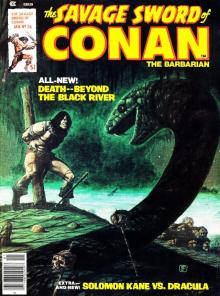 Beyond the Black River
Beyond the Black River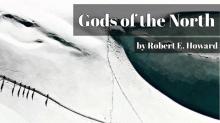 Gods of the North
Gods of the North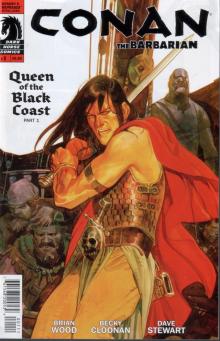 Queen of the Black Coast
Queen of the Black Coast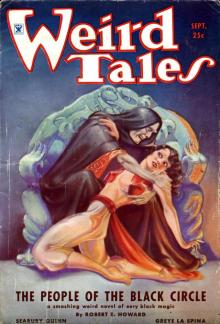 The People of the Black Circle
The People of the Black Circle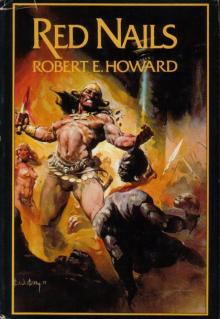 Red Nails
Red Nails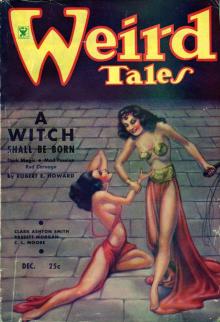 A Witch Shall Be Born
A Witch Shall Be Born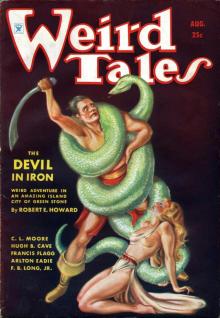 The Devil in Iron
The Devil in Iron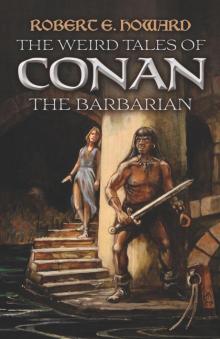 The Weird Tales of Conan the Barbarian
The Weird Tales of Conan the Barbarian The Bloody Crown of Conan
The Bloody Crown of Conan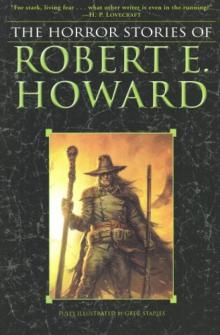 The Horror Stories of Robert E. Howard
The Horror Stories of Robert E. Howard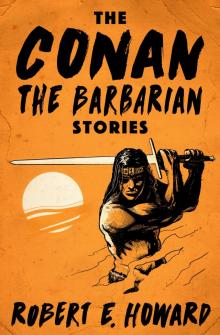 Conan the Conqueror
Conan the Conqueror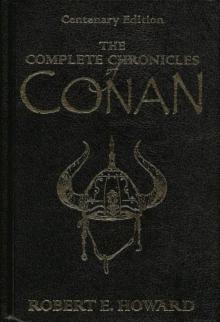 Conan the Barbarian
Conan the Barbarian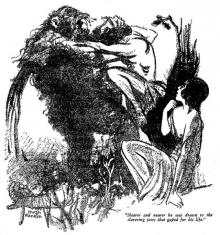 Shadows in the Moonlight
Shadows in the Moonlight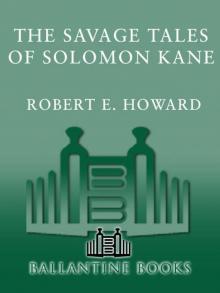 The Savage Tales of Solomon Kane
The Savage Tales of Solomon Kane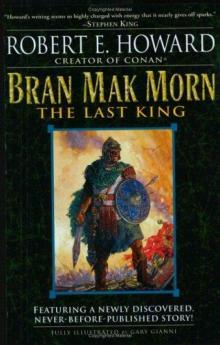 Bran Mak Morn: The Last King
Bran Mak Morn: The Last King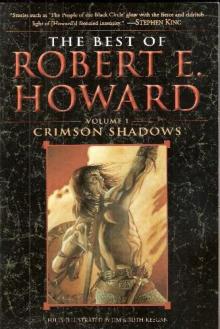 The Best of Robert E. Howard Volume One: Crimson Shadows
The Best of Robert E. Howard Volume One: Crimson Shadows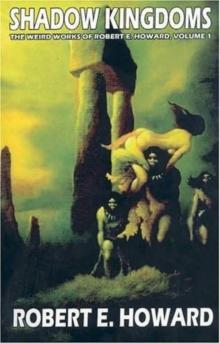 The Best of Robert E. Howard: Crimson Shadows (Volume 1)
The Best of Robert E. Howard: Crimson Shadows (Volume 1)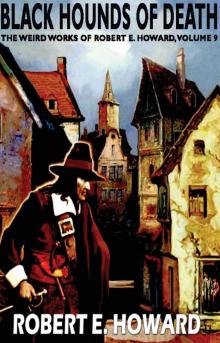 Black Hounds of Death
Black Hounds of Death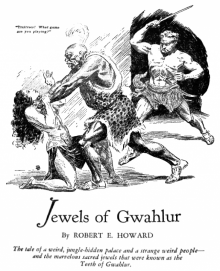 Jewels of Gwahlur
Jewels of Gwahlur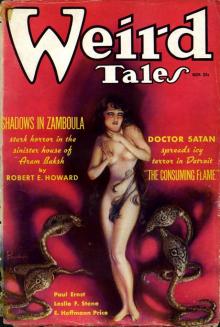 Shadows in Zamboula
Shadows in Zamboula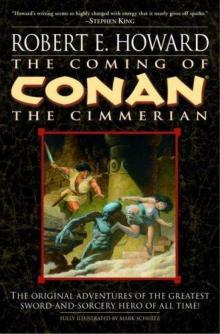 The Coming of Conan the Cimmerian
The Coming of Conan the Cimmerian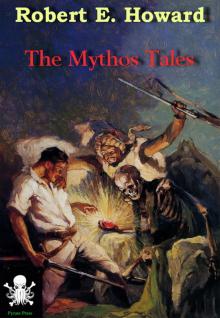 The Mythos Tales
The Mythos Tales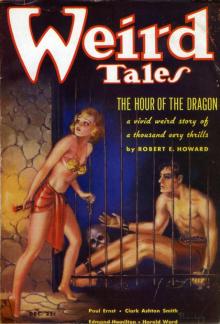 The Hour of the Dragon
The Hour of the Dragon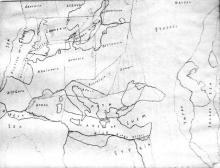 The Hyborian Age
The Hyborian Age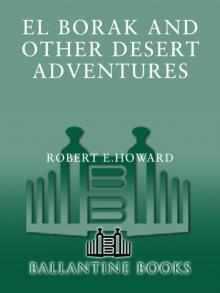 El Borak and Other Desert Adventures
El Borak and Other Desert Adventures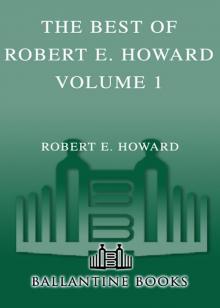 The Best of Robert E. Howard Volume 1 The Best of Robert E. Howard Volume 1
The Best of Robert E. Howard Volume 1 The Best of Robert E. Howard Volume 1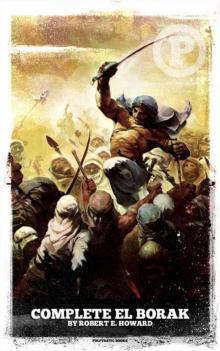 El Borak: The Complete Tales
El Borak: The Complete Tales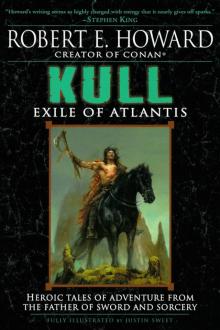 Kull: Exile of Atlantis
Kull: Exile of Atlantis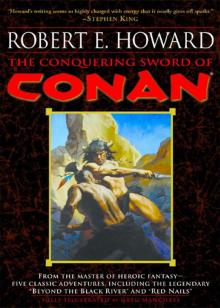 The Conquering Sword of Conan
The Conquering Sword of Conan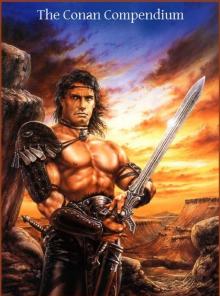 The Conan Compendium
The Conan Compendium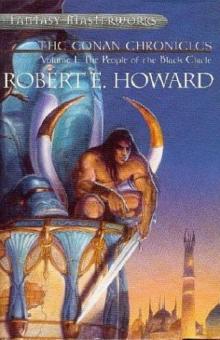 The Conan Chronicles: Volume 1: The People of the Black Circle
The Conan Chronicles: Volume 1: The People of the Black Circle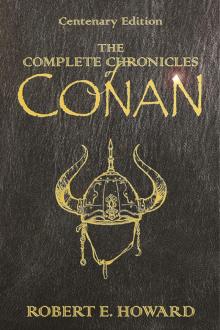 The Complete Chronicles of Conan: Centenary Edition
The Complete Chronicles of Conan: Centenary Edition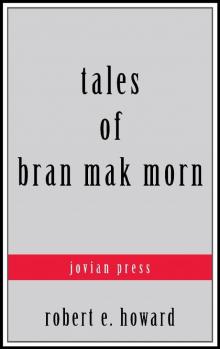 Tales of Bran Mak Morn (Serapis Classics)
Tales of Bran Mak Morn (Serapis Classics)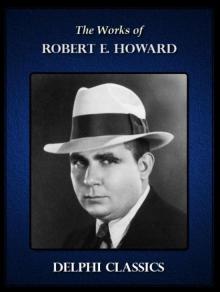 Delphi Works of Robert E. Howard (Illustrated) (Series Four)
Delphi Works of Robert E. Howard (Illustrated) (Series Four)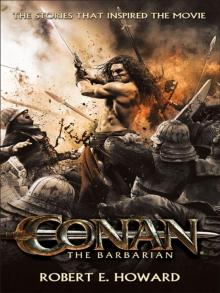 Conan the Barbarian: The Stories That Inspired the Movie
Conan the Barbarian: The Stories That Inspired the Movie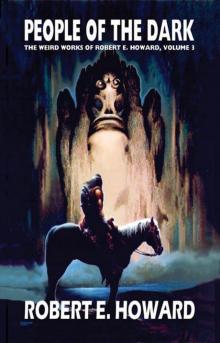 People of the Dark Robert Ervin Howard
People of the Dark Robert Ervin Howard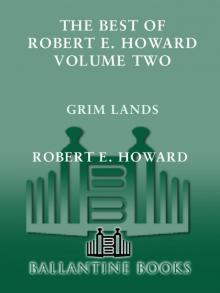 Grim Lands
Grim Lands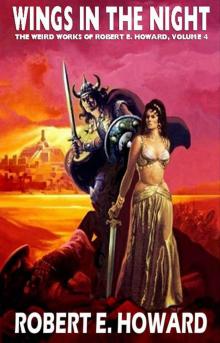 Wings in the Night
Wings in the Night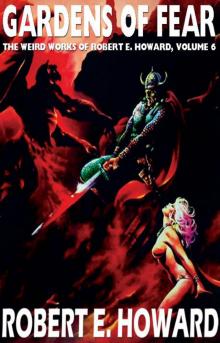 Gardens of Fear
Gardens of Fear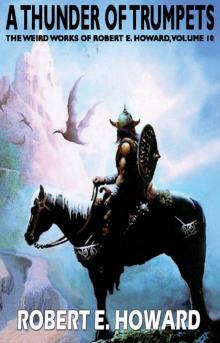 A Thunder of Trumpets
A Thunder of Trumpets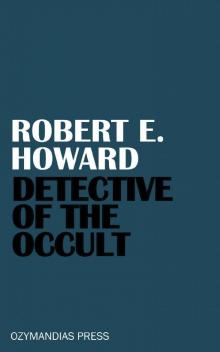 Detective of the Occult
Detective of the Occult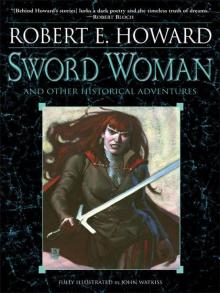 Sword Woman and Other Historical Adventures
Sword Woman and Other Historical Adventures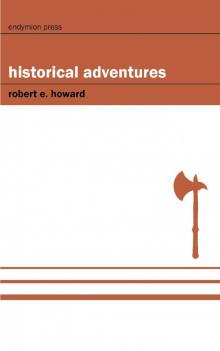 Historical Adventures
Historical Adventures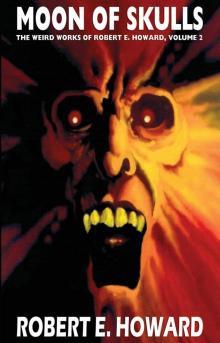 Moon of Skulls
Moon of Skulls The Robert E. Howard Omnibus: 97 Collected Stories
The Robert E. Howard Omnibus: 97 Collected Stories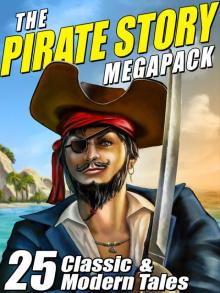 The Pirate Story Megapack: 25 Classic and Modern Tales
The Pirate Story Megapack: 25 Classic and Modern Tales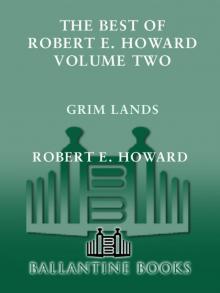 The Best of Robert E. Howard, Volume 2
The Best of Robert E. Howard, Volume 2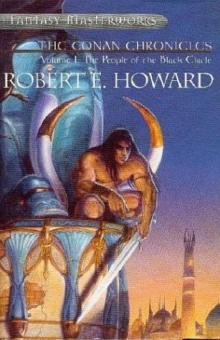 The Conan Chronicles, Vol. 1: The People of the Black Circle
The Conan Chronicles, Vol. 1: The People of the Black Circle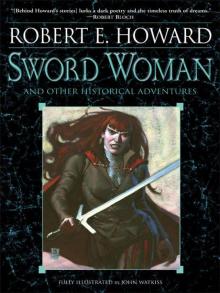 Sword Woman and Other Historical Adventures M
Sword Woman and Other Historical Adventures M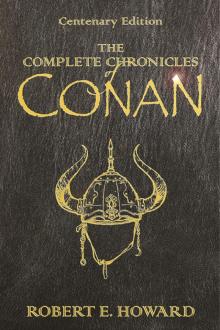 The Complete Chronicles of Conan
The Complete Chronicles of Conan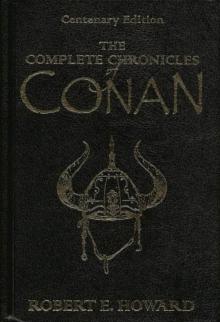 Conan the Barbarian: The Chronicles of Conan (collected short stories)
Conan the Barbarian: The Chronicles of Conan (collected short stories)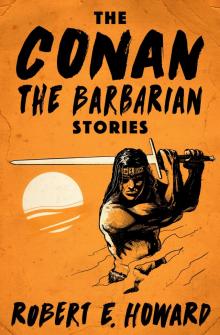 The Conan the Barbarian Stories
The Conan the Barbarian Stories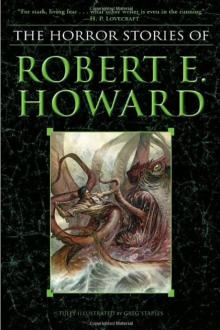 The Best Horror Stories of
The Best Horror Stories of Tigers Of The Sea cma-4
Tigers Of The Sea cma-4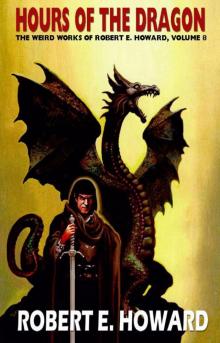 The Hours of the Dragon
The Hours of the Dragon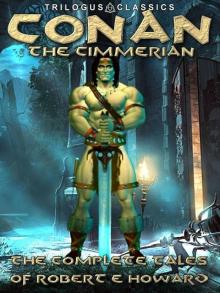 Conan the Cimmerian: The Complete Tales (Trilogus Classics)
Conan the Cimmerian: The Complete Tales (Trilogus Classics)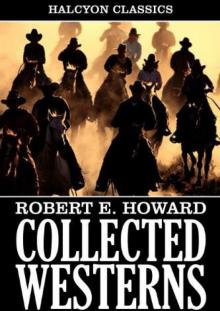 Collected Western Stories of Robert E. Howard (Unexpurgated Edition) (Halcyon Classics)
Collected Western Stories of Robert E. Howard (Unexpurgated Edition) (Halcyon Classics)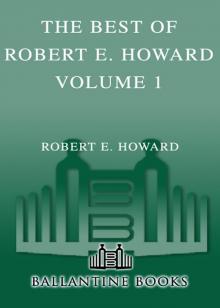 The Best of Robert E. Howard, Volume 1
The Best of Robert E. Howard, Volume 1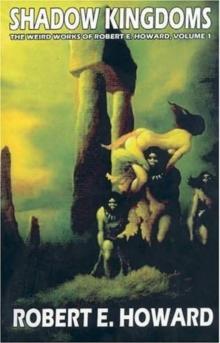 Shadow Kingdoms
Shadow Kingdoms